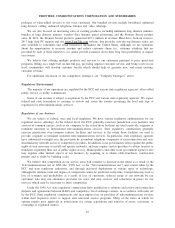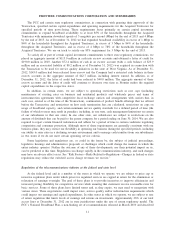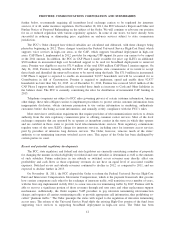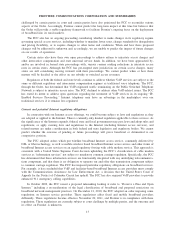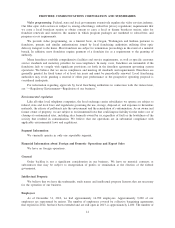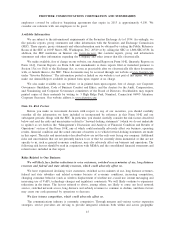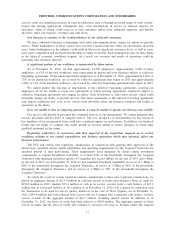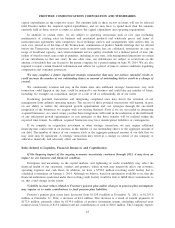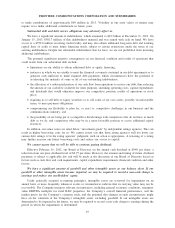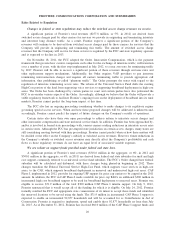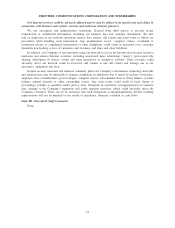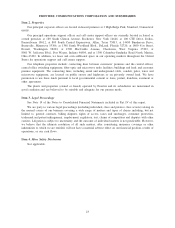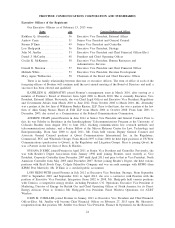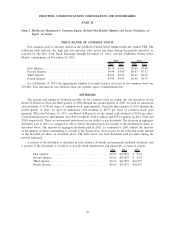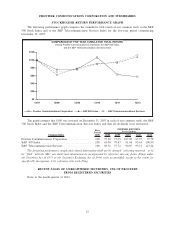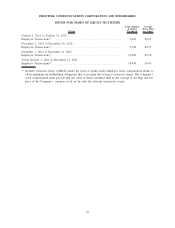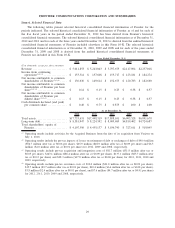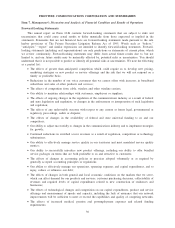Frontier Communications 2012 Annual Report Download - page 21
Download and view the complete annual report
Please find page 21 of the 2012 Frontier Communications annual report below. You can navigate through the pages in the report by either clicking on the pages listed below, or by using the keyword search tool below to find specific information within the annual report.Risks Related to Regulation
Changes in federal or state regulations may reduce the switched access charge revenues we receive.
A significant portion of Frontier’s total revenues ($257.8 million, or 5%, in 2012) are derived from
switched access charges paid by other carriers for services we provide in originating and terminating intrastate
and interstate long distance traffic. As a result, Frontier expects a significant portion of the Company’s
revenues will continue to be derived from switched access charges paid by these carriers for services that the
Company will provide in originating and terminating this traffic. The amount of switched access charge
revenues that the Company will receive for these services is regulated by the FCC and state regulatory agencies
and is expected to decline in 2013.
On November 18, 2011, the FCC adopted the Order. Intercarrier Compensation, which is the payment
framework that governs how carriers compensate each other for the exchange of interstate traffic, will transition
over a number of years, with the first step implemented in July 2012, to a near zero rate for terminating traffic
by 2017. Frontier will be able to recover a significant portion of those revenues through end user rates and
other replacement support mechanisms. Additionally, the Order requires VoIP providers to pay interstate
terminating interconnection charges and requires all carriers terminating traffic to provide appropriate call
information, thus prohibiting so-called “phantom traffic”. The Order preempts the states with regard to the
regulation of intrastate terminating access rates. The reform of the Universal Service Fund shifts the existing
High-Cost portion of the fund from supporting voice services to supporting broadband deployment in high-cost
areas. The Order has been challenged by certain parties in court and certain parties have also petitioned the
FCC to reconsider various aspects of the Order. Accordingly, although we believe that the Order will provide a
stable regulatory framework to facilitate Frontier’s ongoing focus on the deployment of broadband into its rural
markets, Frontier cannot predict the long-term impact at this time.
The FCC also has an ongoing proceeding considering whether to make changes to its regulatory regime
governing special access services. When and how these proposed changes will be addressed is unknown and,
accordingly, Frontier cannot predict the impact of future changes on the Company’s results of operations.
Certain states also have their own open proceedings to address reform to intrastate access charges and
other intercarrier compensation and state universal service funds. In addition, Frontier has been approached by,
and/or is involved in formal state proceedings with, various carriers seeking reductions in intrastate access rates
in certain states. Although the FCC has pre-empted state jurisdiction on certain access charges, many states are
still considering moving forward with their proceedings. Frontier cannot predict when or how these matters will
be decided or the effect on the Company’s subsidy or switched access revenues. However, future reductions in
the Company’s subsidy or switched access revenues may directly affect the Company’s profitability and cash
flows as those regulatory revenues do not have an equal level of associated variable expenses.
We are reliant on support funds provided under federal and state laws.
A significant portion of Frontier’s total revenues ($318.6 million in the aggregate, or 6%, in 2012 and
$300.1 million in the aggregate, or 6%, in 2011) are derived from federal and state subsidies for rural and high
cost support, commonly referred to as universal service fund subsidies. The FCC’s Order changed how federal
subsidies will be calculated and disbursed, with these changes being phased-in beginning in 2012. These
changes transition the Federal Universal Service High-Cost Fund, which supports voice services in high-cost
areas, to the CAF, which supports broadband deployment in unserved and underserved high-cost areas. CAF
Phase I, implemented in 2012, provides for ongoing USF support for price cap carriers to be capped at the 2011
amount. In addition, the FCC in CAF Phase I made available for price cap ILECs an additional $300 million in
incremental high cost broadband support to be used for broadband deployment to unserved areas. Frontier was
eligible to receive $71.9 million of the total $300 million CAF Phase I interim support. On July 9, 2012,
Frontier announced that it would accept all of the funding for which it is eligible. On July 24, 2012, Frontier
formally notified the FCC and appropriate state commissions of its intent to accept those funds and identified
the unserved locations to be served using the funds. The $71.9 million in incremental CAF Phase I support is
expected to enable an incremental 92,877 households and will be accounted for as Contributions in Aid of
Construction. Frontier is required to implement, spend and enable these 92,877 households no later than July
24, 2015. As of December 31, 2012, Frontier has received $66.0 million of the CAF Phase I support funds and
20
FRONTIER COMMUNICATIONS CORPORATION AND SUBSIDIARIES


